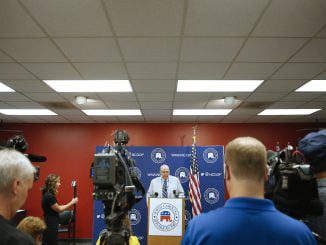RALEIGH — A bill backed by Senate Leader Phil Berger (R-Eden) would reduce personal income taxes in the state on an annual basis beginning this year.
Berger is a primary sponsor of Senate Bill 651, titled Tax Relief For All, along with Sens. Bill Rabon (R-Brunswick) and Paul Newton (R-Cabarrus).
“Republicans in the Senate have a different idea than Democrats when it comes to tax policy,” Berger said in an April 5 statement. “They would like to raise your taxes to fund a costly, big-government agenda. Senate Republicans would rather cut your taxes so you can keep more of your hard-earned money.”
The one-page bill reduces state individual income tax rates on an annual basis beginning with the current tax year:
2023: 4.75% to 4.5%
2024: 4.6% to 3.99%
2025: 4.5% to 3.49%
2026: 4.25% to 2.99%
2026: 3.99% to 2.49%
North Carolina North Carolina’s 4.99% personal income tax was reduced to 4.75% on Jan. 1 of this year.
Ten years ago, the Tar Heel state had the highest personal income tax rate in the southeast with a personal tax rate of 7.75% and a 6.9% corporate income tax. Due to the tax reforms enacted by Republican lawmakers, North Carolina now has one of the lowest personal income tax rates in the southeast.
“When Republicans took majorities over a decade ago, Democrats had left us with a bloated tax system,” Rabon said. “Today our tax system is competitive, lean, and allows us to continue making improvements that benefit all North Carolinians.”
“Our tax policy has proven successful, and we are excited to build on that success,” said Newton. “We believe this tax package will return a significant amount of money to taxpayers while still maintaining the needed revenue to run the state smoothly.”
The press release also took aim at Democratic Gov. Roy Cooper, citing his attacks on tax cuts implemented by General Assembly Republicans and stating that “This year he’s taken that criticism to a new level by calling for a tax hike in his proposed budget.”
Republican leadership at the legislature called Cooper’s final budget proposal as governor “reckless.”
The governor’s proposal would spend $67 billion and increase spending by $33 billion this year or 18% and spend an additional $34.2 billion the year after; another increase of 3.9%.
In contrast, Berger and House Speaker Tim Moore (R-Kings Mountain) agreed to spend $29.7 billion, a 6.5% increase, in 2023-24 and spending of $30.8 billion in 2024-25; a 3.75% increase.



